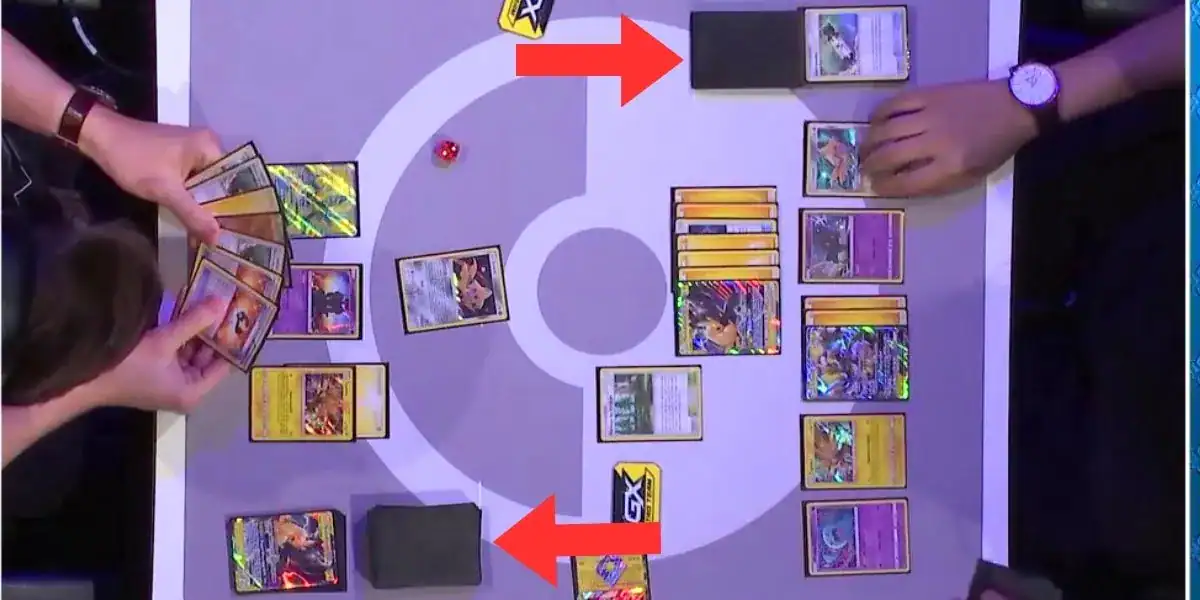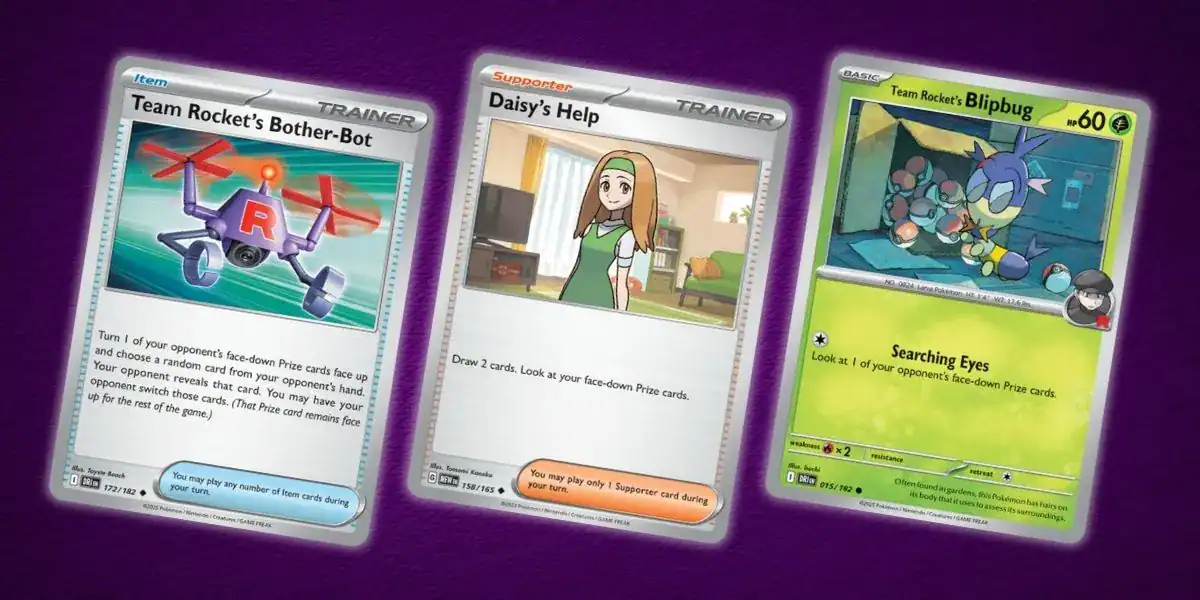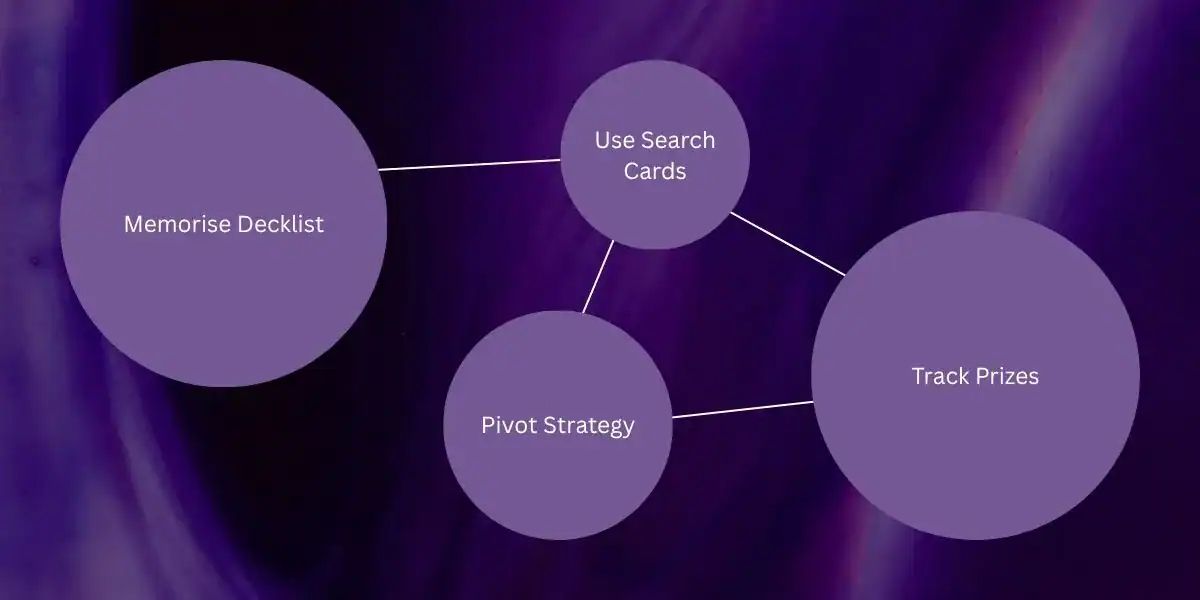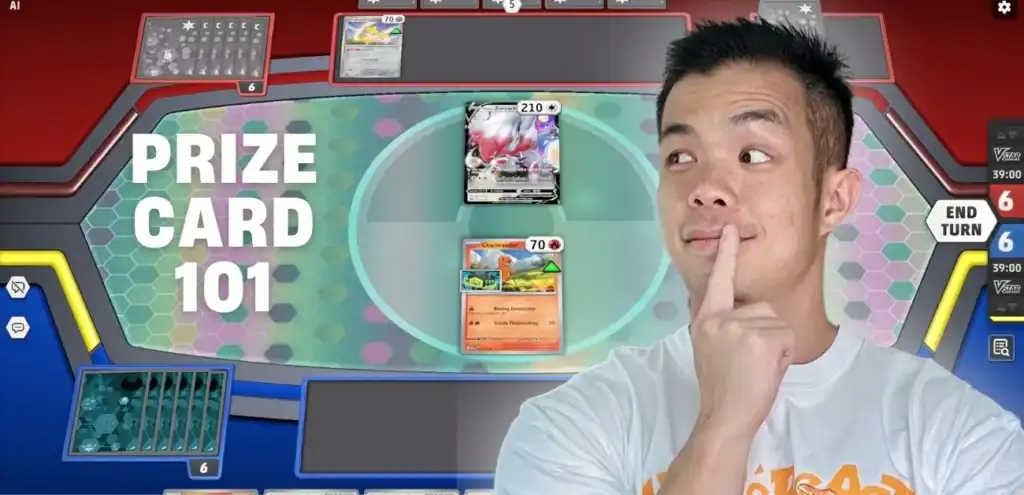Pokémon Prize cards are six face-down cards set aside at the start of a battle. You take one (or more) for each Knock Out. Take all six to win. Learn how to map your prizes to gain the competitive edge.
This post may contain affiliate links. See our affiliate policy for more information.
Ever wonder why your best card never shows up when you need it most? Odds are, it’s sitting in your Prize cards. Those six Prize slots are one of the most important zones in Pokémon TCG.
This guide breaks down everything you need to know about Pokémon Prize cards- what they are, how they work, and how to “Prize Map” your way to outplaying your opponent.
Key Takeaways
- Prize cards are the primary win condition in Pokémon cards. Take all 6 to win the battle. You can also win without taking all Prizes via a deck-out or bench-out.
- Prize values vary depending on what type of Pokémon is KO’d. 1 Prize for regular non-Rule Box Pokémon, 2 for Pokémon ex/V/VSTAR, and 3 for Pokémon VMAX.
- Learn how to map your Prizes early to determine which key cards have been prized and therefore inaccessible.
What Are Pokémon Prize Cards?

When you start a Pokémon TCG battle- after setting up your board and dealing out your opening hand- you place six cards from the top of your deck face down to your left. These are your Prize cards. And any card that’s made its way here is referred to as being “Prized”.
You don’t look at your Prize cards. You don’t pick them. They’re a blind stack of unknown cards.
And here’s the kicker: those six cards are your win condition. Delt enough damage counters to Knock Out one of your opponent’s Pokémon? Take a Prize card and put it into your hand. Take all six? Game over. You win.
Prize cards are everything when playing Pokémon cards. If you’re new to the game, check out our Complete Pokémon TCG Player’s Guide for a big picture of how the Prize pile fits together with the other important battlefield areas.
How Many Prize Cards To Take
How many Prize cards you take for Knockout (KO) depends on what type of Pokémon you KO:
| Pokémon Type | Rule-Box? | Prize Value |
|---|---|---|
| Regular Pokémon | No | 1 Prize card |
| Pokémon ex, V, VSTAR | Yes | 2 Prize cards |
| Pokémon VMAX | Yes | 3 Prize cards |
Think of it like Pokémon tax. Bigger monsters with tankier Hit Points and stronger attacks come with a bigger Prize price.
Prize Card Rules

Here are common Pokémon card Prize rules that often trip up new players and even some veterans.
1. Take A Prize Card Whenever A Pokémon Is Knocked Out
If your benched Pokémon is KO’d? Your opponent takes a Prize card. If your Pokémon enters the Lost Zone? That’s still a knockout, and your opponent takes a Prize card.
Remember, Pokémon TCG cares about if a Pokémon is KO’d, not where the KO’d card comes from or ends up.
2. Self-KOs Result In The Opponent Taking A Prize
Prize cards are taken by the opposing player whenever a Pokémon is knocked out.
This is an important rule because sometimes you’ll find yourself KO’ing your own Pokémon- whether by misplay or intentionally using cards like Dusknoir (SFA 020), which self-KO’s to place 13 damage counters on your opponent’s Pokémon.
When you KO your own Pokémon, your opponent takes a Prize- not you.
3. Poison/Burn Allow Prize Cards To Be Taken Between Turns
Let’s say you Poison your opponent’s Pokémon. What happens after your turn ends and the Poison damage depletes the opposing Pokémon’s HP during Pokémon Checkup?
You still get to take a Prize card even though a KO happens after your attack.
4. Some Cards Allow Prize-Looking
Prizes are always kept face down and remain this way until you put them into your hand. That’s unless another card effect breaks this rule.
There are three cards in the current format that allow Prize looking:
- Team Rocket’s Blipbug (DRI 015) allows you to look at your opponent’s Prize cards.
- Team Rocket’s Bother-Bot (DRI 172) lets you switch one of your opponent’s Prize cards with one from their hand.
- Daisy’s Help (MEW 158) allows you to look at your own Prize cards.
Non-Prize Winning Methods
Alright, so now you know the core of how Pokémon Prize cards work. But what if you don’t take all six? Can you still win?
Yup.
Here’s how players pull off wins without finishing their Prize pile:
1. Bench Out
If your opponent has no Pokémon in play at the start of a turn– not even a sad little Basic- they lose immediately.
This happens more than you’d think in today’s fast-paced meta. If your opponent has a bad start and you manage to clear their only Pokémon on turn one, that’s a bench-out win. That’s why it’s always a good idea to keep backup benched Pokémon.
2. Deck Out
If your opponent tries to draw a card at the start of their turn, but they’ve got no cards left in their deck?
That’s a loss.
This is called a deck out, and it’s an automatic loss. Decking out usually happens when you draw through your deck too fast without recovering cards in your discard pile.
Prize Mapping 101

Despite Prize cards being kept face down, you can use Prize Mapping to mentally decipher what’s in your Prize pile and determine what key cards are unavailable. This allows you to adapt your plays accordingly.
The main gist? Use search cards to go through your deck. If a card is missing, then it’s probably in your Prize cards.
Here’s how to prize map in detail:
Step 1: Memorise Your Decklist
Prize mapping requires you to memorise how many of each card are in your deck, especially key cards. This comes naturally as you practice playing with your deck over many battles.
Working on levelling up to win more battles? Don’t miss our deck-building guide to help refine your skills!
Step 2: Use A Deck Search Effect
Every Pokémon deck should have an engine that improves consistency by searching for other cards. These are cards like Arven, Ultra Ball, Nest Ball, etc.
That first search is more than just setup. It’s intel. Use it to go through your deck and identify key cards for your deck strategy to work.
Here’s what you should mentally check off:
- Can I find all my Evolution Pokémon?
- Are my Boss’s Orders, Switch, or recovery cards there?
- Am I missing a key Basic or Special Energy?
- Is there anything missing that I need to execute my plan?
If you can’t find a card in your deck, you better believe it’s prized. And if a key card islost prized, you’ll need a backup game plan.
I also like to mentally assign each Prize card to a number (Prize 1–6). That way, when you take one, you’ll know what might be coming next.
Step 3: Track Prizes As You Take Them
Prize tracking doesn’t end after your first search. It continues the whole game. Each time you Knock Out a Pokémon and take a Prize? Check it immediately. Don’t just toss it in your hand.
Did you just grab a missing Rare Candy? That means your Evolution chain is back online. Finally, pull your second Special Energy? Now you’ve got opportunities to charge up your Pokémon.
This level of awareness turns every Prize pull into an opportunity to pivot your strategy mid-game.
Step 4: Pivot Strategy With Prize Knowledge
Here’s where Prize awareness can save your game.
Let’s say you’re behind, and your last copy of Rare Candy is prized (you know this because you checked earlier). But you need it to win.
Instead of targeting a tanky ex Pokémon, maybe you use Boss’s Orders to pick off a Bench-sitter to try and dig into the Rare Candy.
In other words, you’re taking strategic knockouts based on your Prize Mapping.
Conclusion
Understanding how Pokémon Prize cards work is fundamental to playing Pokémon cards. But to separate yourself from the casual newbies, use Prize Mapping to turn random KOs into strategic plays. Every search, every knockout- it all matters. Because good players play like every Prize card is within reach.
FAQ
Kalam is a PTCG gameplay expert and content creator. He started playing and collecting Pokémon cards since 1996. When he’s not working, you can find him nerding out on Anime!
Ready To Level Up At PTCG?

